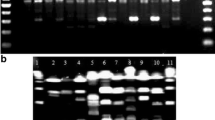Abstract.
The use of randomly amplified polymorphic DNA (RAPD) for rapid, reliable, and easily interpreted identification of enterococci was evaluated. Nineteen type strains of Enterococcus, 12 reference strains, and 114 clinical isolates of Enterococcus were analyzed. Discrimination was obtained between most type strains, the exceptions being Ent. casseliflavus and Ent. flavescens, which had relatively similar RAPD-profiles. Ent. faecalis and Ent. faecium were readily separated, and Ent. gallinarum and Ent. durans could also be identified. Extracts to be used in the polymerase chain reaction (PCR) were prepared directly from agar plate colonies, which made it possible to complete the identification procedure in one day. RAPD was proved to be a fast and reliable method for identification of most Enterococcus spp. of clinical significance.
Similar content being viewed by others
Author information
Authors and Affiliations
Additional information
Received: 5 November 1997 / Accepted: 8 December 1997
Rights and permissions
About this article
Cite this article
Quednau, M., Ahrné, S., Petersson, A. et al. Identification of Clinically Important Species of Enterococcus Within 1 Day with Randomly Amplified Polymorphic DNA (RAPD). Curr Microbiol 36, 332–336 (1998). https://doi.org/10.1007/s002849900318
Issue Date:
DOI: https://doi.org/10.1007/s002849900318




